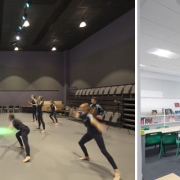Six Zentia ceiling systems feature on one of Northumberland’s largest schools.
A range of Zentia’s suspended ceiling tiles and grid systems have been used as part of an award-winning project to transform one of Northumberland’s largest schools. The Queen Elizabeth High School in Hexham, Northumberland, was crowned “Project of the Year – Schools” at the Education Estates Awards in November 2022.
A total of almost 11,000m2 of Zentia’s Dune eVo, Perla, Hydroboard, Bioguard and Hygiene tiles, all in white, as well as Colortone Neeva tiles in black, were specified by Ryder Architecture for the £38 million redevelopment.
One of Zentia’s largest projects in the education sector, Zentia manufactured and supplied a versatile range of ceiling solutions to suit a variety of environments with variable performance requirements. The judges said the scheme was “a great design solution on a challenging site that includes a listed building” and a “beautiful integration, well presented.”
The school, which was established in 1599 before expanding into the retained Grade-II listed Hydro building in 1976, was a complex refurbishment project with several vastly different ceiling technologies required.
Working with contractor Galliford Try and two specialist sub-contractors, Keyes Brothers Construction Ltd and Riss Ltd, Zentia supplied a total of 8,670m2 of Cradle to Cradle® Certified Dune eVo Tegular and Max Tegular for use in the classrooms and corridors. An additional 615m2 of laminated Perla dB Tegular and 1,000m2 of Perla OP 0.95 Tegular was used on the top floor as well as in specific classrooms requiring additional acoustics, such as music rooms and workshops.
 In addition, the Colortone Neeva with black grid and trim was used in the assembly room and lecture theatre; 140m2 of Bioguard Plain Tegular, known for its antimicrobial performance, was used in the kitchen; 60m2 of Hydroboard, a specialist tile designed for high humidity areas, in the toilets, and 440m2 of Hygiene, a tile suitable for high pressure cleaning, in the kitchen and dining hall.
In addition, the Colortone Neeva with black grid and trim was used in the assembly room and lecture theatre; 140m2 of Bioguard Plain Tegular, known for its antimicrobial performance, was used in the kitchen; 60m2 of Hydroboard, a specialist tile designed for high humidity areas, in the toilets, and 440m2 of Hygiene, a tile suitable for high pressure cleaning, in the kitchen and dining hall.
In the more humid environments of the kitchen and toilets, the tiles were used with a non-corrosive trim and grid.
SIG in Newcastle acted as the distributor of these products to ensure a seamless delivery to site.
Keyes Bros had teams of up to 30 operatives on site for 10 months. Procurement Manager Aiden Keyes said: “Client teams are always demanding sustainable products and Zentia’s recycling programme and Cradle to Cradle Certification more than meets these demands. Installation-wise, it was a tight programme with ongoing coordination issues whilst having to navigate and work through Covid 19 restrictions, so we had to be even more proactive than usual.”
Riss also had teams of up to 25 on site, also for 10 months. Construction Manager Charlotte Edmonds said: “The spec was determined before it reached us, but we still went out to the market and looked at all the options and decided that Zentia had a strong regional presence offering support. With this in mind we did not challenge the specification.
“The project was challenging due to the time frame and ensuring all works were complete to enable the school to re-open on time, but the Zentia products performed great. There were no problems and they looked very good upon installation and completion of the project.”
She explained that the waste ceiling material was segregated into allocated bins provided by Galliford Try but the amount of waste was minimised as Riss used the cut-offs for rips around the perimeter.
At Queen Elizabeth High School, the creation of a high quality and welcoming environment will benefit both the 1,300 students and surrounding community, with the project combining the very best of modern educational facilities in a sustainable setting, blended with the existing buildings on the site.
Galliford Try’s Operations Director Jeremy Barnett, who attended the official opening, said: “It was fantastic to be part of a ceremony that showcased to the Education Secretary, Nadhim Zahawi MP, the high-quality learning environment we have created at Hexham. We hope that students, staff and the local community benefit from these facilities for years to come.”
Head of Queen Elizabeth High School Neil Seaton said: “The new building provides facilities that reflect the ambition of our school and the requirements of a 21st Century learning environment.”
CLICK HERE To find out more about Zentia’s comprehensive product range














